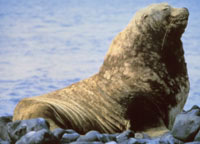The drama of the presidential election, they say, has awakened the interest of the public, and especially of young people, in the democratic process.
So welcome, young people, to the entertainment that never ends. Once the question “who won?” is settled, other questions begin. What are the people who won up to? For whose benefit? At whose expense?

Mufasa, Steller sea lion.
Photo: NOAA
Take, for example, the epic battle between Bill Clinton and Ted Stevens (R-Alaska), the head of the Senate Appropriations Committee. (The standard media title is “the POWERFUL head of the Appropriations Committee.” This guy controls the bills authorizing all the money the government spends.) Clinton and Stevens have been wrestling for months over those government funding bills. Central to the fight has been the fate of an animal called the Steller sea lion.
The sea lion, which can reach the size of a small car, lounges along the chilly coasts of the Bering Sea, the Aleutian Islands, and the Gulf of Alaska in Sen. Stevens’s home state. Its population is crashing, down from 140,000 in 1960 to 16,000 now. In 1990, environmentalists sued to make the government declare the Steller endangered. (Why, young people may ask, do citizens need to sue the government to make it enforce an environmental law? Well, that has to do with campaign funding, as you’ll see in a minute here.)
Sen. Ted Stevens and the Alaska fishing fleet owners, who provide him with campaign funds, say they have no idea why the Steller sea lion is in trouble. But this is actually a no-brainer. The sea lion lives on fish. Its population started plummeting precisely when and where huge bottom-trawlers started to scoop up cod and pollock and mackerel in million-ton quantities. The main catch, the pollock, is shipped to Japan, where it is ground into fish paste or made into fake crab meat. The fake crab meat is handy, because the bottom trawlers also destroy crabs.
The cold waters off Alaska are full of nutrients and therefore full of fish and therefore full of creatures that eat fish. Here’s what happens when people take virtually all the fish away. The sea lions and seals and sea birds starve. The orcas — sleek black and white killer whales — can no longer live on their favorite snack of fat seal. So orcas start eating sea otters, those cute aquatic acrobats that float on their backs and play games in the water. The sea otters disappear. That causes an explosion of sea urchins, which is what sea otters eat, when they’re around, which they aren’t any more. The bloated sea urchin population munches away the great kelp, the many-foot-long seaweed that forms underwater forests where hundreds of other species live.
In short, the whole ecosystem falls apart. The fishery is also on the verge of falling apart. There are so few pollock left that the ships are having trouble filling their government-determined quotas — quotas that have been raised steadily over the past 10 years, despite the endangered state of the sea lion and despite biologists’ warnings that the fishery itself is near depletion.
Under court order, government biologists finally drew up a plan to cut back the allowed pollock catch by about 20 percent, so that sea lions, seals, birds, orcas, and otters might live (and fishermen too, in the long run). So Ted Stevens, Powerful Head of the Appropriations Committee, routinely sticks onto every spending bill a little “rider” saying that the Endangered Species Act shall not apply to the Steller sea lion. Let it go extinct. Sea lions don’t give campaign contributions, and their friends the enviros don’t give nearly as much as the fishing industry does.
The Republican-led Congress, in its wisdom, approves the bill with the rider and sends it to the president. Take that, Bill Clinton! Sign, or the government will run out of money! Enviro groups pelt the White House with letters, faxes, and emails pleading “don’t sign, don’t sign!” Clinton sends the bill back to Stevens unsigned and tells him to take the rider away.
Stevens takes the rider off, attaches it to the next spending bill, and so it went all fall. Last month, they got to the last bill. High noon. Sea lion or fishery. Government funding or Endangered Species Act. Stevens vs. Clinton, eye to eye, do or die.
Every bit as exciting as hanging chads!
Clinton, knowing it was his last chance, didn’t blink. Stevens, knowing he’s about to have a much more amenable president, settled for a $50 million bribe (to go to sea lion research and Alaskan fishing communities). The rider was removed. The government will have operating funds and will enforce the Endangered Species Act. For a year, anyway.
What do you think will happen next year?
Young people, this is just one small tale from the multi-channel soap opera of politics. It’s better than “The West Wing,” and it runs every day, with never a rerun. Better yet, you get to play with the plot; you get to write letters and faxes and emails, to give campaign contributions if you can afford it, and to decide — if you vote and if they count the votes — who shall win next time, what they shall be up to, for whose benefit, at whose expense.


